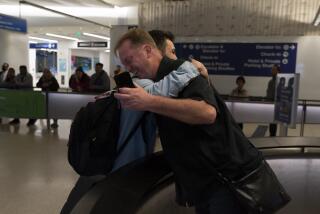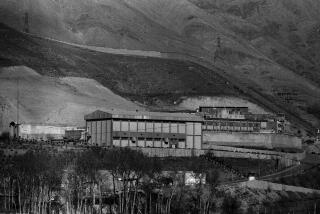Malcolm Kalp, 63; One of U.S. Hostages in Iran
- Share via
Malcolm Kalp, an alleged CIA officer who was repeatedly beaten and was kept in solitary confinement for most of the 444 days he was held by militants in Tehran during the Iran hostage crisis two decades ago, has died. He was 63.
Kalp died Sunday in Stoughton, Mass., when the truck he was driving flipped over after it was hit by a car driven by what police said was a drunk driver. Kalp died at the scene.
The driver of the other vehicle, charged with vehicular homicide and driving under the influence, pleaded not guilty to the charges in court on Monday.
Kalp arrived in Tehran for his posting in the economic and commercial section of the U.S. Embassy just three days before it was seized by Islamic militants Nov. 4, 1979.
Initially seeking the return of the deposed Shah Mohammed Reza Pahlavi, who was in the United States for cancer treatment, the militants held 52 Americans for 444 days. The hostages were released the day Ronald Reagan was sworn into office as president.
Although many of the embassy’s vital documents and almost all of its sensitive communications equipment were destroyed by staffers as militants stormed the compound, documents found in the office of embassy charge d’affaires L. Bruce Laingen identified Kalp as one of three CIA agents on station.
It was that disclosure, and Kalp’s apparent unwillingness to talk, that led to his harsh treatment.
In interviews after his release, Kalp said he was kept in 22 different cells and spent 374 days in solitary confinement. He said he attempted to escape three times, once nearly succeeding by picking a lock in his room.
He said he spent seven straight days in handcuffs and was beaten twice while bound.
“I took several kicks in the head on three different occasions in Iran,” Kalp told the Washington Post.
After his release, he complained of ringing in his ears that he said stemmed from his beatings.
Kalp was part of a group of 13 former hostages who attempted to sue the Tehran government for $5 million each in damages. However, a federal judge in Los Angeles threw out the lawsuit because President Jimmy Carter, as part of a failed effort to negotiate the release of the hostages, had signed an agreement with Iran pledging that no such legal action would be taken.
During the hostage crisis, though all kinds of information was made available on the lives and families of most of the hostages, little information turned up on Kalp. His wife at the time turned down requests for interviews, and neighbors in Fairfax, Va., said they didn’t know much about him or his family.
Some reports said he was born in Brooklyn, others Boston. He reportedly served in U.S. Special Forces in Vietnam.
After retiring in the late 1980s, Kalp reportedly lived in Southern California for a time before returning to the Northeast. According to the Boston Globe, he had been making a living selling plumbing supplies in a flea market over the last few months. He was apparently on his way to the flea market Sunday when the accident occurred.
When the U.S. lifted a ban on imports of Iranian nuts, caviar and carpets in early 2000 in an effort to improve relations, Kalp was less than enthusiastic.
“Let them pay major sums of money to the 241 U.S. servicemen they killed at the Marine barracks and the embassy people they killed in Beirut and then I’d be more than happy to eat their nuts, eat their caviar and lay on their rugs,” Kalp told reporters.
He is survived by his second wife and two children.
More to Read
Sign up for Essential California
The most important California stories and recommendations in your inbox every morning.
You may occasionally receive promotional content from the Los Angeles Times.













